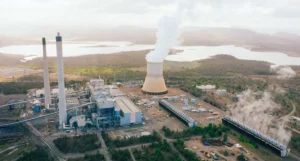The board of industrial giant BHP will back a call from shareholder advocacy groups to expand a review its membership of industry associations, including those that have actively campaigned against stronger climate change policies.
The Australasian Centre for Corporate Responsibility (ACCR) sponsored a shareholder resolution for BHP’s upcoming AGM that would see BHP “strengthen” a review of its membership of a range of industry associations to ensure they are consistent with the commitments of the Paris Agreement.
“Where an industry association’s record of advocacy is, on balance, inconsistent with the Paris Agreement’s goals, shareholders recommend that our company suspend membership, for a period deemed suitable by the Board,” the motion says.
The motion effectively targets BHP’s membership of groups that include several groups that openly advocated for an expansion of Australian coal and gas extraction and opposing government policies that would seek to reduce emissions.
While the ACCR’s motion won’t require BHP to relinquish its membership of these industry groups, it will raise expectations that BHP may look to end memberships of industry groups that have openly advocated against stronger climate policies.
“BHP remains a member and therefore a funder of APPEA, the Minerals Council of Australia, the NSW Minerals Council and the Queensland Resources Council – the biggest opponents of climate policy for more than 20 years,” ACCR’s director of climate and environment Dan Gocher said.
“BHP’s industry associations must end their obsession with fossil fuel expansionism. As the IEA’ Net zero by 2050′ report concluded, we cannot afford any new or expanded coal, gas or oil extraction if we are to have any chance of limiting global warming to 1.5°C.”
“Origin Energy and South32 should follow the lead of BHP and Rio Tinto, and support the shareholder resolutions on climate-related lobbying at their upcoming AGMs,” Gocher added.
A similar motion moved last year’s BHP annual general meeting received the support from 22.4 per cent of shareholders, after being opposed by the board.
The BHP board said that it would support the latest ACCR motion, saying that it believed it to be consistent with BHP’s current approach to reviewing its membership of industry associations, adding that it thought there was a range of measures BHP could take when it stood in conflict with the positions of industry groups.
However, the BHP board said that it retained a preference for trying to influence industry groups from the inside rather than ending its relationships with the groups altogether.
“In accordance with BHP’s principles for participating in industry associations, if BHP’s review identifies a material difference with a member association on climate policy, BHP will consider a range of remediation measures, including suspension or cessation of membership,” the BHP board said in a statement.
“BHP’s general view, however, is that there is greater scope to achieve positive climate outcomes if the Group uses its influence within industry associations to influence the association’s approach to climate policy.”
BHP said that it had already influenced the policy positions of the NSW Minerals Council, after the industry group suggested “emissions reduction should be deprioritised relative to the goals of affordability and reliability.”
BHP said that it had been able to compel the NSW Minerals Council to publish a new climate change position statement, confirming that it supported the goals of the Paris Agreement.
BHP also unveiled a new Climate Transition Report, which reiterated its target to decarbonise its own operational emissions, as well as setting a target for zero scope 3 emissions by 2050, addressing the carbon embedded in materials produced and processed by BHP.
As part of its climate transition plan, BHP says it will look to spend US$100 million to US$200 million each year over the next five years in the decarbonisation of its operations. This is on top of a US$400 million commitment to a Climate Investment Program for emissions reduction initiatives.
BHP said that it had already begun purchasing supplies of renewable electricity at a number of its operations, including securing an agreement to meet up to half of its electricity needs at its Queensland Coal operations with renewables and is on track to transition its Escondida and Spence copper mines to 100 per cent renewables from next year.
But ACCR said that it was disappointed to see that BHP had spent just US$65 million of this latter fund in the last year on the decarbonisation of its steelmaking operations.
“The only significant new commitment in BHP’s Climate Transition Action Plan is its target for some of its Scope 3 emissions. BHP has set the target of net zero emissions by 2050 for the operational emissions of its suppliers and the shipping of its products, which appears to exclude the emissions from steelmaking – by far the largest share of its Scope 3 emissions,” Gocher said.
“BHP must use its unique position of leadership to push for more ambitious emissions reductions before 2030.”








